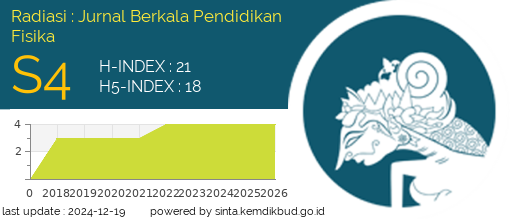Development of Arduino-Based Electrical Practicum e-Module
Abstract
The development of IoT-based innovative learning media to improve student competence is needed in the era of industrial revolution 4.0. This study aims to develop an electrical practicum e-module using the Arduino Uno experimental tool to get valid, practical, and effective criteria. The research method uses R&D with four D models. The development stage consists of the stages of defining, designing, developing, and limited dissemination. Data analysis used descriptive analysis with Aiken V. The results showed that the e-module get the criteria of high validity with index V = 0.87. 60% of the total number of students responded positively to the media, and 40% were very active when using the media, so the modules developed were considered practical. The effectiveness level of the module shows that 100% of the students get a higher learning outcome value than the learning completeness score, so it can be concluded that the e-module has met the effective criteria.
Downloads
References
Kemristekdikti, “Pengembangan Iptek dan Pendidikan Tinggi di Era Revolusi Industri 4.0”, 2018, Retrieved from https://www.ristek-dikti.go.id/pengembangan-iptek-dan-pendidikan-tinggi-di-era-revolusi-industri-4-0/, diakses tanggal 3 Agustus 2018.
Kanematsu, H., & Barry, D. M, "STEM and ICT Education in Intelligent Environmens", London: Springer International Publishing Switzerland, 2016.
Lee, J., Lapira, E., Bagheri, B., & Kao, H., "Recent advances and trends in predictive manufacturing systems in big data environment", Manufacturing Letters, 1(1), 2013, pp.38–41.
Liffler, M., & Tschiesner, A., "The Internet of Things and the future of manufacturing", McKinsey & Company, 2013.
Abubakar, I., Khalid, S.N., Mustafa, Shareef, M. W.H., &. Mustapha, M., "Calibration of Zmpt101b Voltage Sensor Module Using Polynomial Regression For Accurate Load Monitoring", Journal of Engineering And Applied Sciences, 12 (4), 2017, pp.1076-1084.
Atkin, K., "Using the Arduino with MakerPlot software for the display of resonance curves characterisic of a series LCR circuit", Physics Education, 51(6), 065006, 2016, doi: https://doi.org/10.1088/0031-9120/51/6/065006.
Pereira, N S A., "Measuring the RC time constant with Arduino", Phys. Educ. 51, 065007, 2016, doi:10.1088/0031-9120/51/6/065007.
Retnawati, H., “Validitas Reliabilitas Dan Karakteristik Butir (Panduan untuk Peneliti, Mahasiswa, dan Psikometrian)”, Yogyakarta: Parama Publishing, 2016 .
Sudijono, A., “Pengantar Statistik”, Jakarta: Raja Grafindo Persada, 2010.
Arifin, Z., “Evaluasi Pembelajaran”, Jakarta: Direktorat Jenderal Pendidikan Islam Kementerian Agama RI, 2012.
Widayanti, W., Yuberti, Y., Irwandani, I., & Hamid, A., “Pengembangan lembar kerja praktikum percobaan melde berbasis project based learning”, Jurnal Pendidikan Sains Indonesia, 6(1), 2018, pp. 24-31.
Labibah, U. N., Wilujeng, I., Sulaiman, S., & Rahmawati, L. “Android-Based physics learning media integrated landslide disaster”, Jurnal Ilmiah Pendidikan Fisika Al-Biruni, 8(2), 2019, pp. 229-236.
Saregar, A., Marlina, A., & Kholid, I., “Efektivitas Model Pembelajaran ARIAS ditinjau dari Sikap Ilmiah: Dampak terhadap Pemahaman Konsep Fluida Statis”, Jurnal Ilmiah Pendidikan Fisika Al-Biruni, 6(2), 2017, pp. 255-263.
Hadiati, S., Kuswanto, H., Rosana, D., & Pramuda, A. "The Effect of Laboratory Work Style and Reasoning with Arduino to Improve Scientific Attitude". International Journal of Instruction, 12(2), 2019, https://doi.org/10.29333/iji.2019.12221a
Hadiati, S., Kuswanto, H., Rosana, D., & Pramuda, A. "The Comprehensive Physics Laboratory Work With Model-Based Reasoning to Improve 21st Century Competence". Journal of Physics: Conference series, 1185, 2019, 012049. doi:10.1088/1742- 6596/1185/1/012049.
Copyright (c) 2021 Matsun Matsun, Soka Hadiati, Adi Pramuda

This work is licensed under a Creative Commons Attribution-NonCommercial 4.0 International License.




